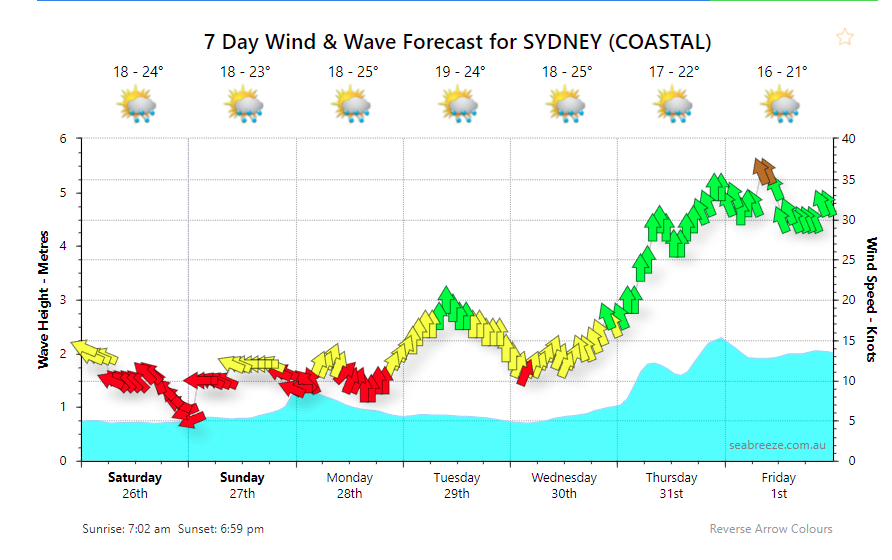Next Passion
After weeks of inclement weather we have had a couple of delightful races in very pleasant conditions. Last Wednesday at the RANSA race our clubmate Joli did a bolter and shot off from the start like a TP52. Within a few minutes she was two minutes ahead and stayed there all day. Well done to Adrian and the crew on Joli.
The breeze for the day was on the margin for our No 3 jib and being a little undermanned we made the conscious desison to play safe. That choice showed on the downwind leg to the heads where we arrived behind mid fleet. Rounding behind Allegro, Brittania and Fidelis we carried on as far as possible to the rocks before tacking for Steele Point. With some good fortune of our own we tacked onto a lift which gained some ground immediately. After the long board to Steele Point we tacked back on another lift and managed to catch both Allegro and Fidelis. After that there were not many passing lanes and try as we might we could make no impression on Love Byte and Brittania. Our sixth place on handicap was consistent and we clawed back a few points from the massive lead of Allegro but let Brittania off the hook by another three points.
Happily we are in third place and yet to have a really favourable wind.
Today was the West Harbour Winter Series for which event we were down to just three crew, Elaine, Frank and myself. The breeze when we were preparing for the race was a few knots so we went for our old 1.5 genoa which is higher clewed and easier to skirt. For the start we opted to play safe with a late start on the committee boat but that did not stop Matagi barging in late. Not wanting to force the issue we called them through and started last in gusty conditions . Fortunatly for Passion X only the last work from Birkenhead to Long Nose was tight and for the rest we could crack the sheets off a few inches and concentrate on dropping the main in gusts.
Despite the fresh breeze mid river the condition around Manns mark were chaotic with big swings in direction and plenty of holes. This is where we passed Maxishambles who had to tack back to round the mark and do so in no breeze.
I could not see what happened on the second rounding of this mark but it appeared both Maxishambles and Ophir had similar bad luck. On the second rounding of Manns we made up ground on Another Planet and Bear Necessities but not enough. As we had to give these two yachts time we could manage only a third. I mean we were deligheted to score third place given the small crew.
On the boat building front we lost three days with sailing and other social activities so if it seems to you my progress has been slow it seems that way to me.
A day was spent fairing the strongback back to beyond the keel and a day was spent cutting the first four panels for the bottom. It was another long day fastening and gluing the first two panels at the bow and this was a day that went long after dark.

Cleaning up the keel floor while I can attack them from above and below has been a priority. Also I needed to complete the keel bolt holes through the kingplank and these activities have taken up at a good part of two days of work time.
Next on the schedule is completing the keel floor cleaning and applying a couple of sealing coats of clear epoxy. At the same time I want to epoxy the limber holes through the floors while the channel is still accessible from above. I would like to seal the timber and have a slippery surface through the limber holes before the ply goes on and limits access. The keel floors are 125 mm wide and 150 wide along the strongback and the spaces between the floor are less so no post ply access will be possible


I have a good record of the progress I made building Passion X and that is a handy guide to my progress on the new build. Last night while checking photos to see what internals I had installed before plating the hull I noted that I seem to be six weeks behind.
Comparisons can be difficult because on the new build I have already painted a lot of the interior which I did not do until much later in the build on Passion X.
Even allowing for the extra work already competed on the new build I feel that I am behind. The weather is in no small part to blame as this has to be one of the most consistently wet seasons in a long time. I am fortunate that the middle of the yacht is under the awning which was not installed at this stage of the build on Passion X but despite the cover the weather has been too wet and windy to do any meaningful work in many days.
Ther is also more work on the new build including more laminates in the keel floors and more packers between the keel floors and the 12 mm ply skin.
I have some optimism that I will make up the time later in the build. Summer is coming and with it longer days more can be done. Also with the experience of the first yacht behind me I may have less thinking to do on how to fit the internal furniture. Then there is the interior finishing that has already been completed including sanding priming and painting as well as filleting of the hull to the bulkheads.
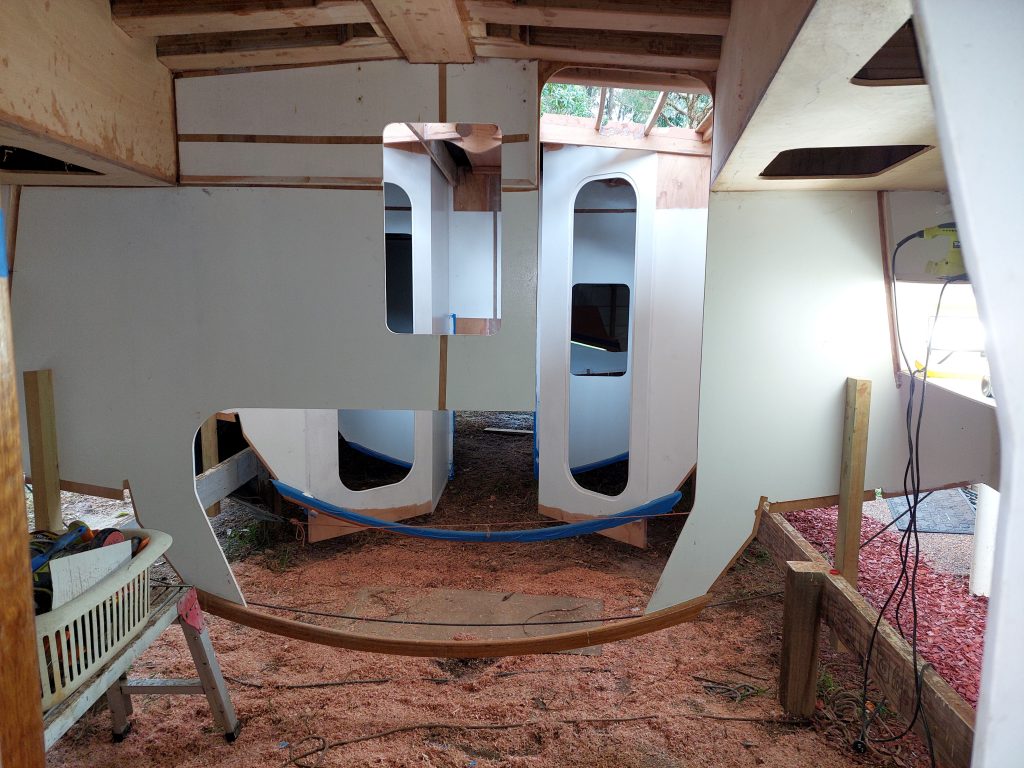

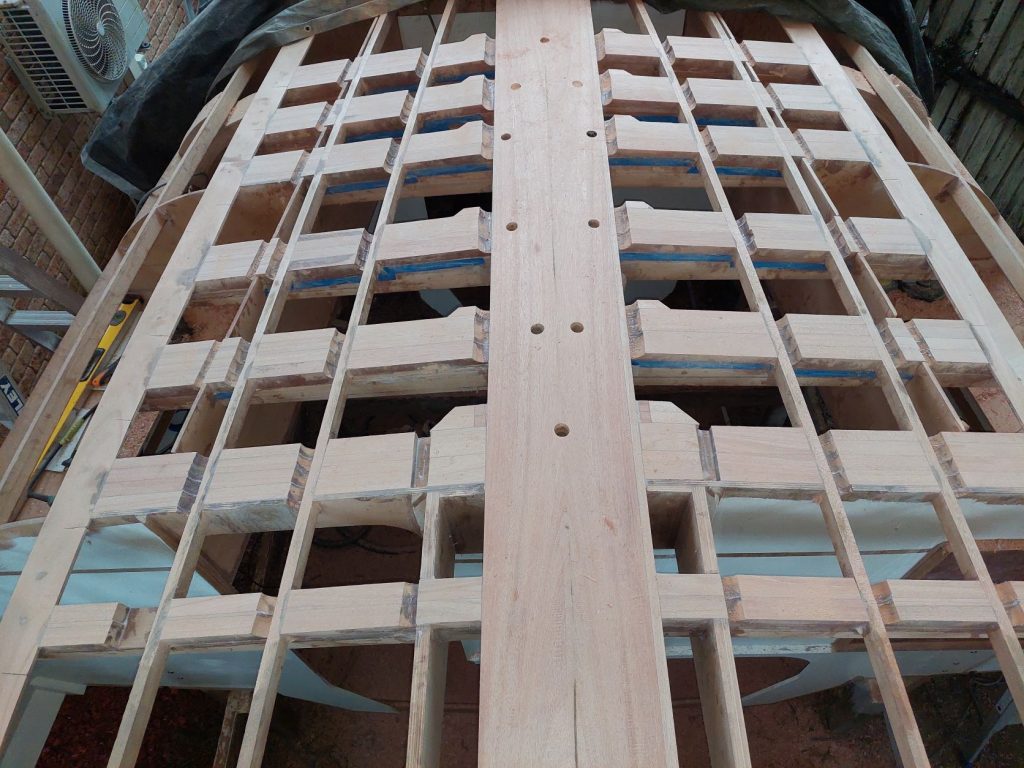
Only time will tell if I catch up and in the meantime I cherish every moment of fine weather.
With the Winter Wednesday series at RANSA we have been lucky to escape the worst of the weather although a lot of the fleet seem to have given up.

With a smaller fleet and some good performances we have crept up the series score sheet to be third behind Allegro and Brittania. Of course this has not gone unnoticed by the handicapper and good results will be harder to get from here on. The handicapper is doing a good job however and placings are separated by seconds so any mistake is well punished.
We had a double win on Wednesday with a first and fastest at RANSA where a depleted fleet of just six yachts and crews braved the wet conditions. Full marks to all the hardy souls who turned up especially my loyal crew. Top comment of the day was from Don when I offered to pick him up at his door step for the ride to the club. “So it is too wet for me to walk but not too wet to sail!” Yes Don that’s right.
For a second week the wind angle suited Passion X. We don’t do so well when there is long tacks directly into the wind but when the course is just a few degrees free we hit our straps and so it was that we took off from the start and while Allegro and Britannia gave us good competition we had a big enough lead going into Rose Bay that we were able to defend that lead. We did get nervous whenever the breeze dipped into single digits as our No 3 jib needs at least 12 knots for us to hang in with the fleet.
Looking at the forecast from here there may not be a race this week and if there is it will be a hard slog home and not our favorite conditions.
On the boat building front it has been a very trying time. The week was wet up to the Wednesday race and Thursday was overcast and cool. By Friday the neighbour suggested that I spread the covers out on the lawn and dry them and the hull out. I took his advice and did the same today, Saturday.
These last two days were ideal boat building weather with lots of progress making the 192 spacers that go between the keel floors and the 12 mm ply skin. So good had progress been that I have almost caught up with my self imposed target of two weeks to finish the task. The forecast is however for rain again tomorrow so I will make excuses already.


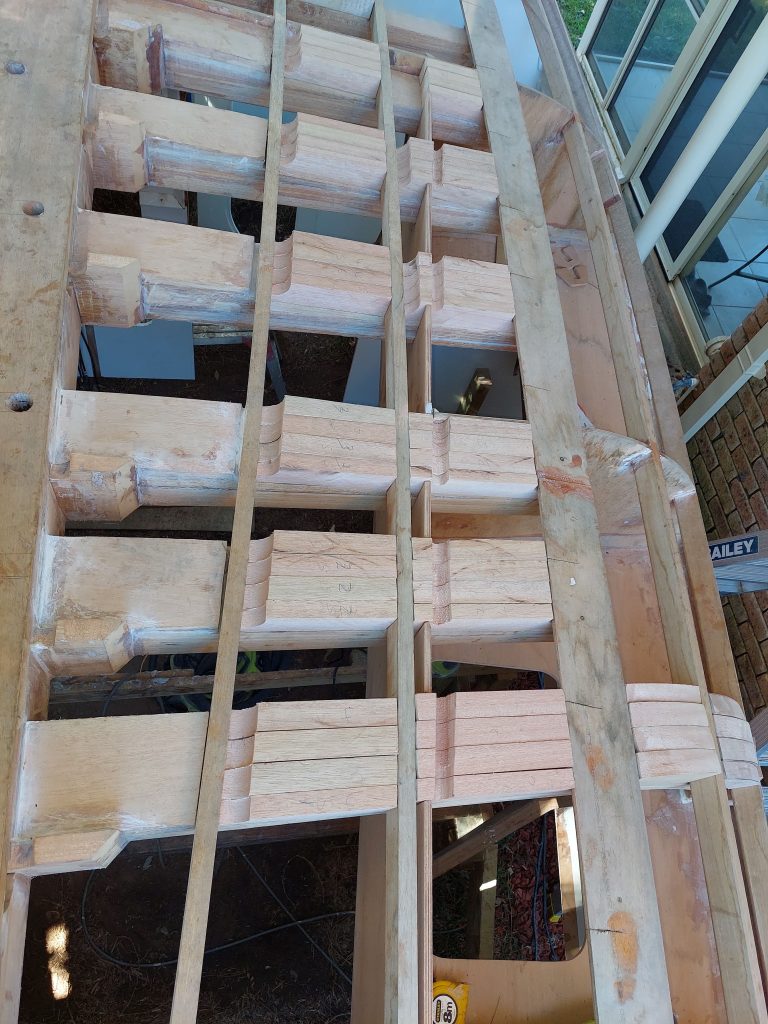

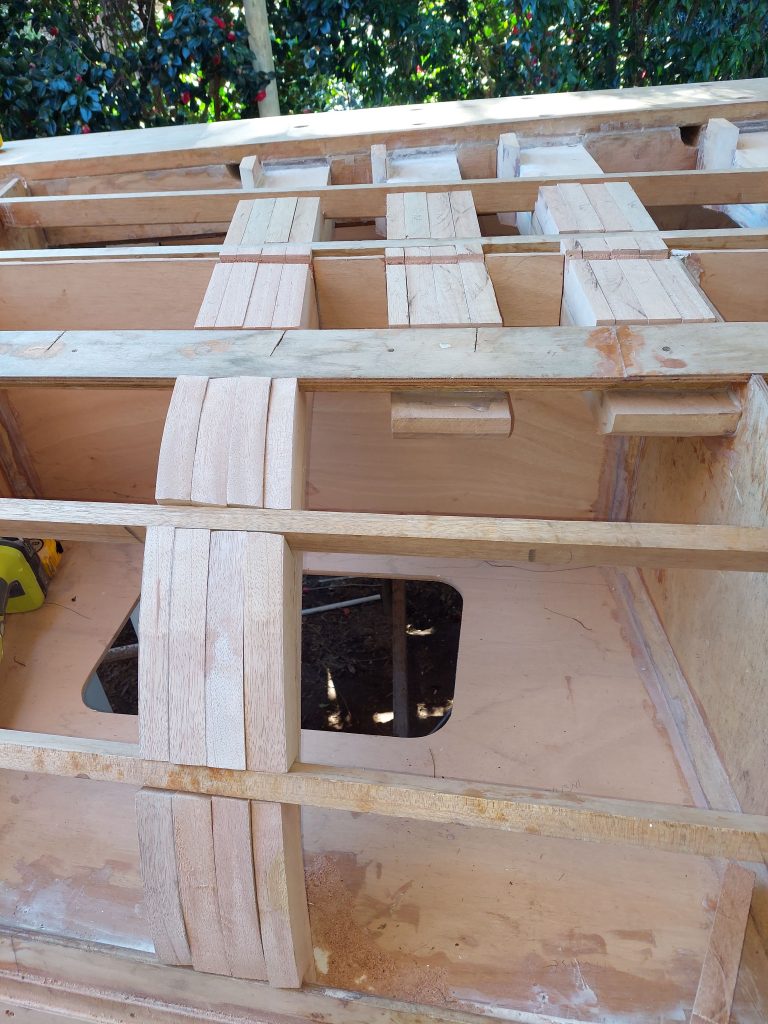
In the wet I confined myself to the comfort of the garage and made four frames for the water tank lids. The aim is to have the lids identical including the screw holes as I found it frustrating that the four lids on Passion X were bespoke. To achieve my aim I made up a gluing guide and ensured that the four frames were as near as identical as possible and am pleased with the result.

With the wind and rain forecast for the coming week I am reluctant to set myself any hard goals but I hope to finish the packers even if I have to wait for fine, warm and dry weather to glue them in place.
Other jobs I can do are to finalize a plumbing diagram as the route for the plumbing is quite different to Passion X and I need a route that does not go through the keel floors. And then there is the route for the fuel and throttle controls and for the wiring from the battery bank to the switch panel. A lot of these holes are best drilled before the ply skin is attached and at a time when the holes can be well sealed with epoxy.
I have 192 individual packer to make to go between the keel floors and the 12 mm ply bottom. The grain of the packers runs across the hull and each floor has six segments that need packers each made up of four individual blocks. Each set of four packers needs to have a neat limber hole against the stringer. Fortunately each of the four blocks in each location are of similar size so the blocks can be mass produced and trimmed on site for the final fit.
Yesterday I made packers for two locations and hand fitted a few sets of four for proof of concept.

Today the rain and cold returned but I was able to continue working on the packers as they are in the middle of the awning. Along the way I got distracted from the mass production and started fitting the packers on the large floor that runs from the keel to the chainplate frames. These are approximately 560 mm radius so I marked up shapes with an appropriate radius and proceeded to cut the curves with the jigsaw. By afternoon tea I had cut only eight packers or the equivalent of two of the 12 spaces on this long frame. I got even more distracted and started cleaning up stringer connections to the bulkheads ready for epoxy fillets and plywood doublers where needed.
Realizing that time was getting away I set up the bench saw and went into full mass production mode.
With a disciplined approach to producing the packers I finished cutting two thirds of the required packers by knock off time.

I will have to be disciplined to keep up this production rate as i do have a lot of stringers to fillet to bulkheads and I am tempted to progress the water tanks by fitting the flanges for the tops and glassing the interior. It will have to be completed before the radius chine section is moulded in place so there is several weeks time on the critical path but it is a job that is staring at me and almost begging me to finish it first.

Today, Saturday 2nd July, the weather tuned rather wet and cold so the above photo shows the tarpaulins pulled back just enough for me to work on the spacers.

Did I mention that we won the race at RANSA on Wednesday? It was a fresh breeze with a fair bit of north in it so a single beat to the top mark and a broad reach home. We did particularly well to windward until Allegro worked out from under or rather a large header put us in their dirty air. We still made the mark in a single board and on the way home poled out the genoa to leeward with a short whisker pole. As we pulled away into Rose Bay we ran with the short pole and kept ahead of Cuckoo’s Nest and Allegro into Rose Bay.
On the work around the island we came unstuck when we tacked early and had to take three sterns. We got one back on the starboard board into the mark but Cuckoo’s Nest was away and Meridian and Agrovation pulled even further ahead. We tried to run down Allegro but she was too good off the stick. Nevertheless with our more favorable handicap we scored a first by a few seconds and a much needed confidence booster.
Three weeks ago I fitted the 12 mm ply sides to the hull and then took a week break to drive to Buderim for some minor civil engineering work at or No 3 son’s home. The break was a healthy one with plenty of exercise and fresh air and it was time for a break from sawdust and epoxy. On return to Sydney I was slowed down by a virus which was neither Covid nor Influenza A or B. Despite a negative diagnosis it was not a bug I wished on anyone so I had a quiet week confined to the boat building site.
The first of the jobs tackled was glassing in the chainplate frames with five layers of double bias of which two are over the whole frame. The frames are angled in line with the spreader angle so one side is easy to work on and the acute angle side is a big awkward. While in the epoxy glass mode I completed all the internal glass joins to get the itchy jobs out of the way. As careful as I was I failed in my endeavours to keep my clothing glass free so for comfort sake I put the glassing clothes aside and started afresh with new clothes and a resolution to be even more careful.
So far my care has worked as the glass had been trimmed and sanded successfully.


The next task was to bog in all the shelves on at least one side so that after turning the other side can be completed easily. Once the shelves were horizontal and stable it was time to prime all the bare plywood internals.


Priming the internal plywood had not been on my construction plan but the bout of continual wet weather we had earlier in the year convinced me that the bare plywood had to be primed to protect the timber from the dreaded mould that was growing in every home in NSW. Now the weather had improved greatly but once set out on the journey to prime the timber it was a journey that needed to be completed.
As well as bogging in the shelves all the bulkheads and stringers had to be filleted in with structural epoxy bog before the priming could be started.
Having decided on a fillet size I prepared a test piece to satisfy myself that the structural strength was satisfactory. Being confident I had completed all the filleting before the test piece was cured enough for the test. It passed with the plywood test piece breaking instead of the fillet.
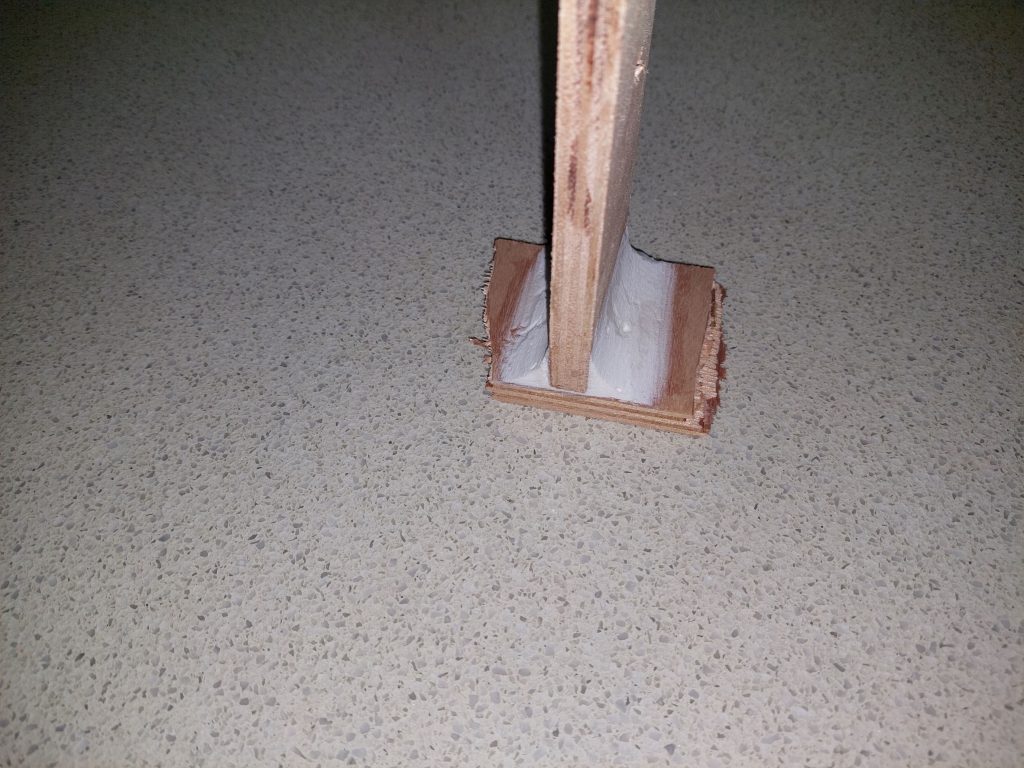
Doing structural fillets is an acquired skill. As simple as it looks it takes time to master the techniques and do the work at an efficient pace so some of my fillets are excellent and some needed a lot of post cure surgery before they were tidy enough for painting. As time progressed my speed and quality improved so that the finished job looks fairly professional.
A lot of the fillets will be hidden inside cupboards but the perfectionist in me refused to do these to any lesser standard than the ones in full display.
It takes a day to sand from the mast step to the transom on one side and then apply one coat of primer so there has been four very big days sanding and painting to get the two coats applied.


After the first coat the sanding back reveals any defects that need more preparation and the first coat brings up the wood fibres which need to be removed before the second coat is applied.
Planning ahead I prepared some of the internal ply that up to this time only a single coat of primer so that any left over primer could be used efficiently on a second coat and that has worked well with nothing wasted.
At the bow I have three bays which have the first coat of primer and are sanded back ready for their second coat. I think that is the next step and that will use up what primer I have.
Next job is to do all the packing pieces between the keel floors and the hull so that when I affix the bottom ply the internal work is complete. To be prudent there is probably two weeks work in that exercise .
We were surprised that the race was abandoned when we were all the way back to Steele Point and had only to get to a short course finish in Rose Bay which is the usual order of events in light winds. There was a good chance that the calm in Rose Bay could have persisted but we were coming down with wind.
Up to that point we had been having a wonderful afternoon with three knots of westerly wind carrying the fleet out towards the Sow and Pigs. Everyone seemed to have a turn doing well. Amanti jumped out early only to have to wait as she sailed into the doldrums first. Agrovation went South and missed the whisp of westerly that carried the fleet forward. We started near the boat and stayed south of the fleet waiting for the wind shadow from Fidelis to pass to windward. Once in clear air we accelerated to keep pace with the fleet and headed down the rhumb line. We were doing well to leeward of the fleet but in clear air so it was unsurprising that Cuckoos Nest and Crosshaven came across on starboard. We wriggled behind the starboard gybe Crosshaven and Monkey Magic and held our course for the distant mark.
Everyone seemed to have a turn at catching up but by good luck we managed to keep gapping few boat lengths on the fleet except for Amanti and Agrovation.
As the breeze swung from zero knots to a 6 knot south east we hunkered down into beating mode but keeping it fast. Being inside Amanti and Agrovation we made up a little ground and rounded just behind Amanti. Britannia came charging in from deep down south and rounded on our stern. They very promptly had their large genoa poled out to leeward and maintained a position to windward of Passion X while we were chasing down Amanti.
Then the news of the abandonment came across the radio and that was it.
As the fleet order stood Britannia would have been clear leader with Passion X a good prospect for a second on handicap but it was not to be.
In the tug of war between adding more plywood panels towards the stern and finishing the ply that was already installed the extra plywood won out.
It was not a hard choice as the weather suited adding more sheets of plywood and once I got into a routine the extra six sheets to finish the sides back to the stern progressed well.
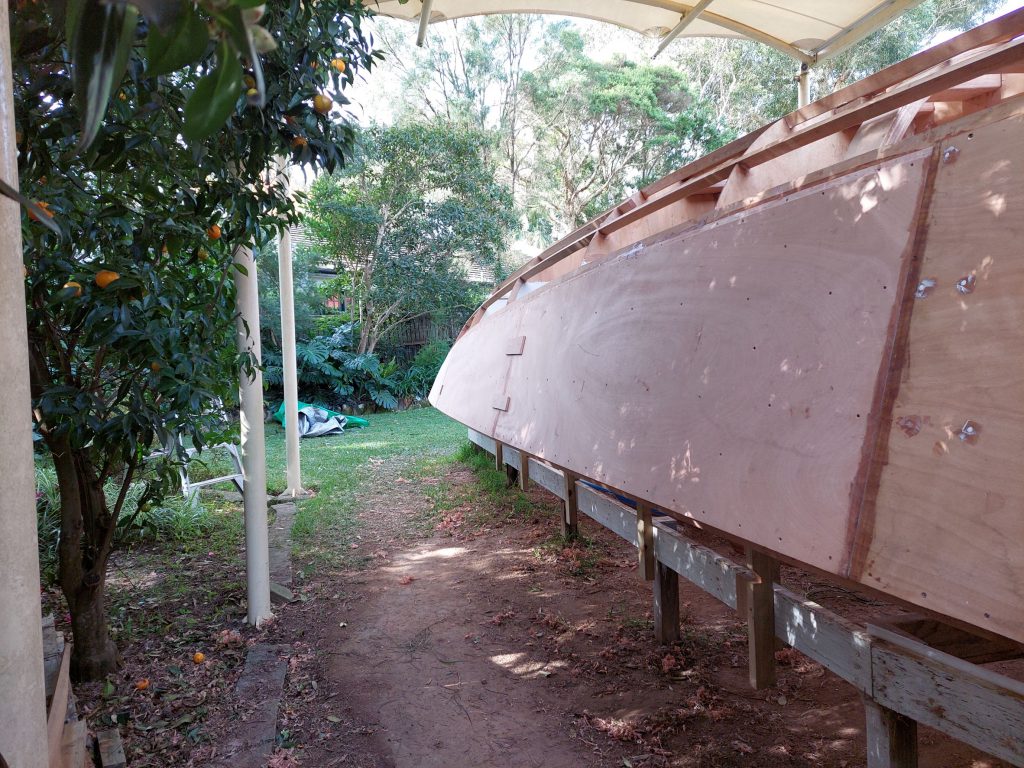
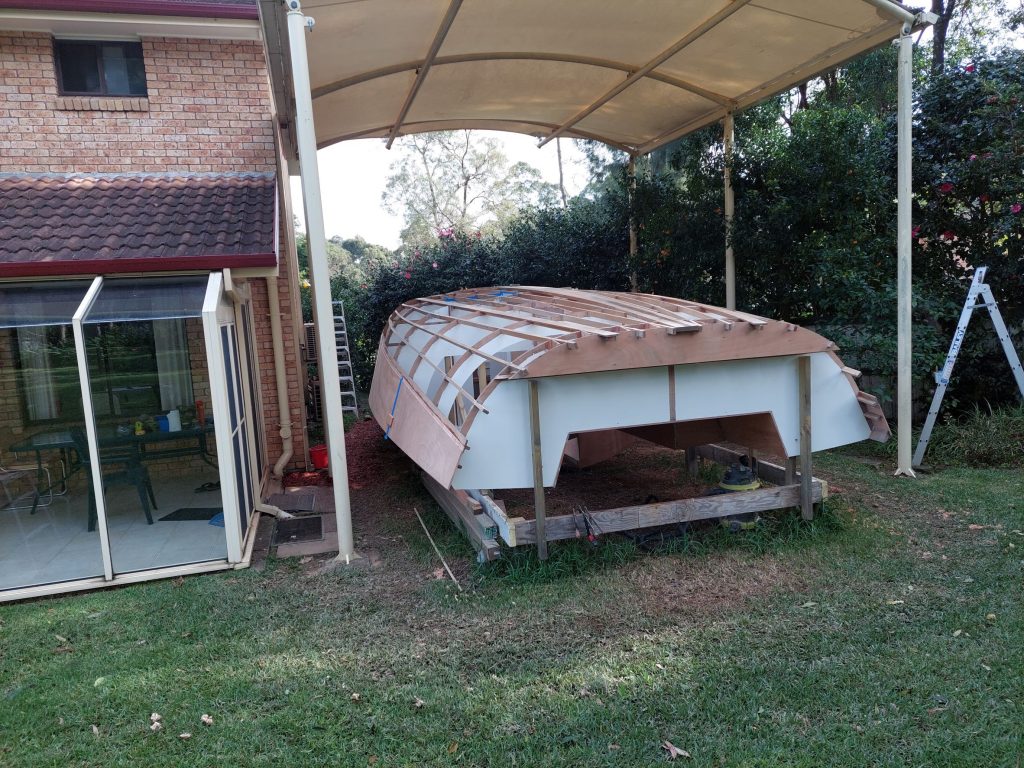
While it appears that a lot of progress has been made the appearance is deceptive. The hull had been prepared for the ply sheets many weeks ago while I was waiting for construction drawings for the keel floors. Likewise I had already cut and fitted ten shelves so gluing in the six shelves in the quarter berth area was a quick task. Nevertheless i did recheck all the stringers and did take a few plane strokes off here and there. Finally all the surfaces to be glued were sanded.
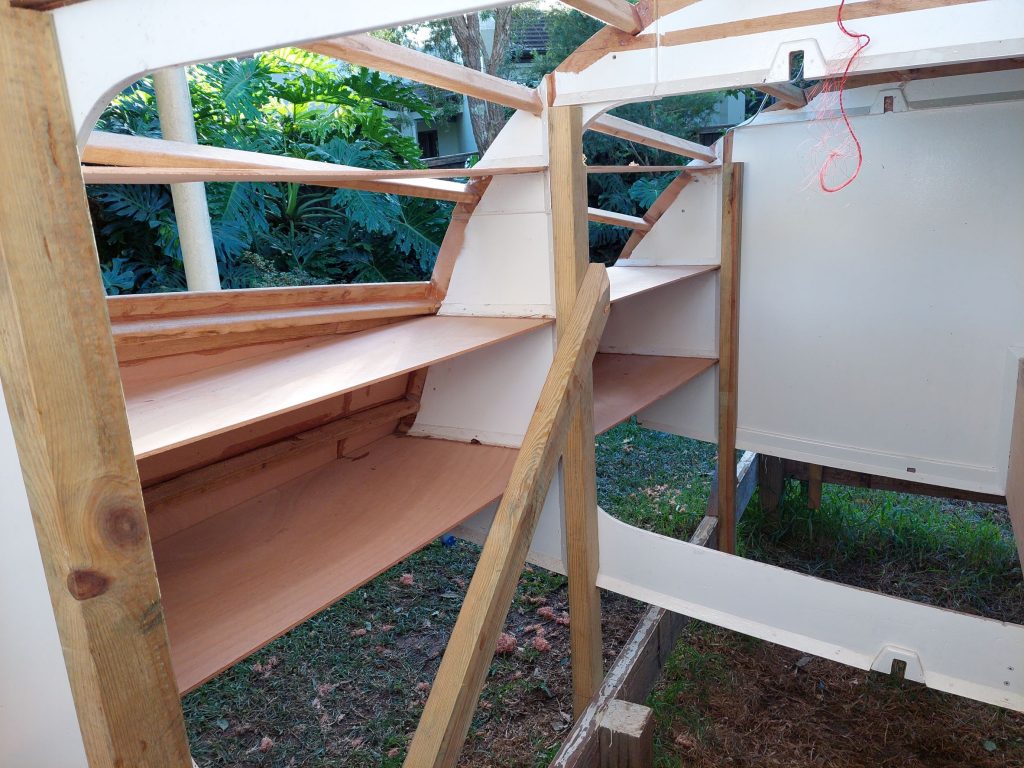
When the Wednesday racing at RANSA was cancelled due to the strong wind warning I used the time to advantage and fixed more panels. It was helpful that the two sided are identical so that once one side was trimmed to size it was a template for the other side.
By Thursday I had only one sheet to fit and that was already cut to size, marked with the stringer positions and had the edge rebated at the tangent chine.
Fitting the sheets to the hull was not without drama with the occasional shower threatening but with help from Elaine the panels were all fixed to the hull.
The balance of Thursday was spent with some finishing tasks and priming a lot of bare plywood in the quarter berth and cockpit locker areas. This priming is bringing forward a lot of finishing and I am confident that the road to completion is shortening with every coat of primer.
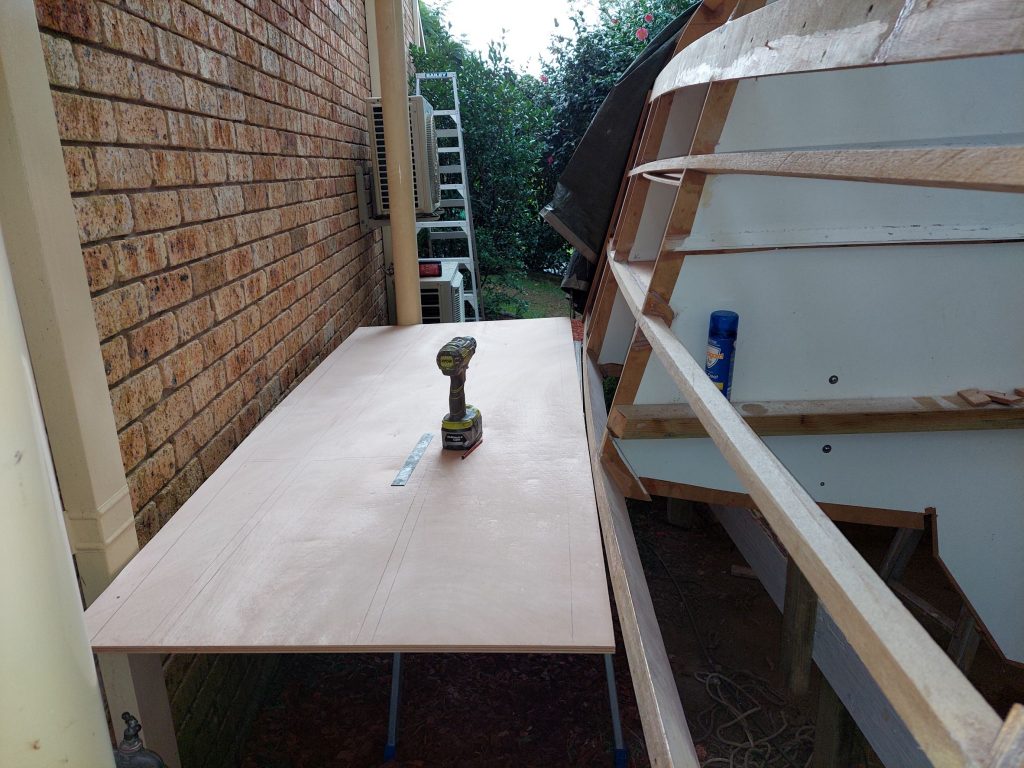
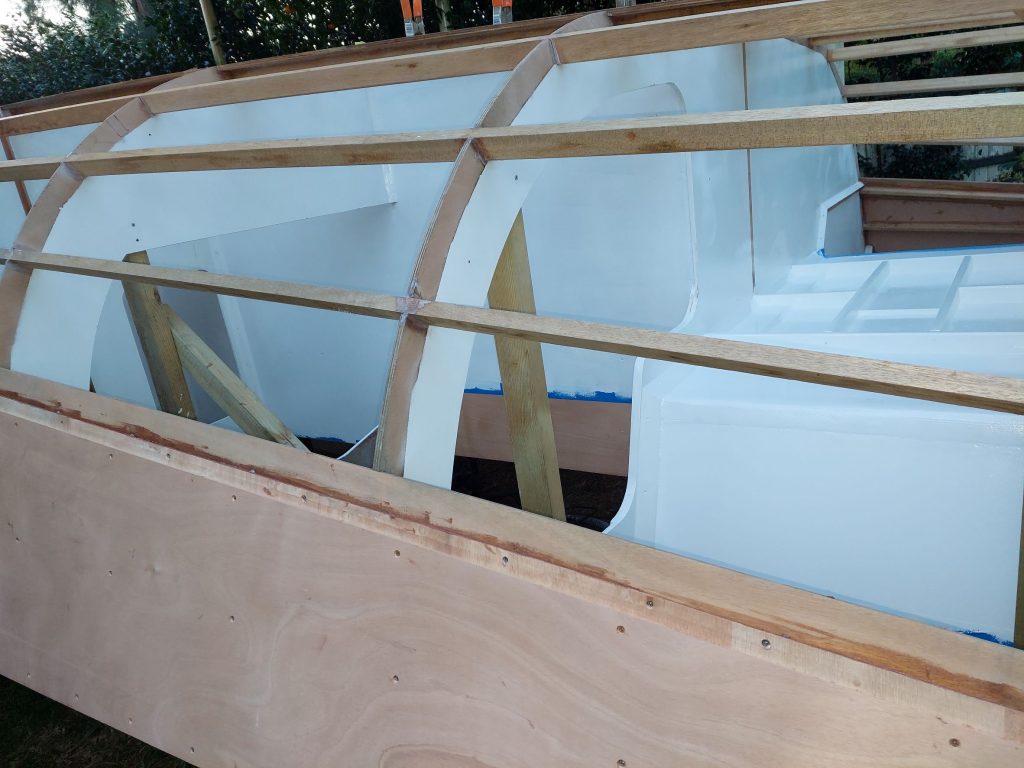
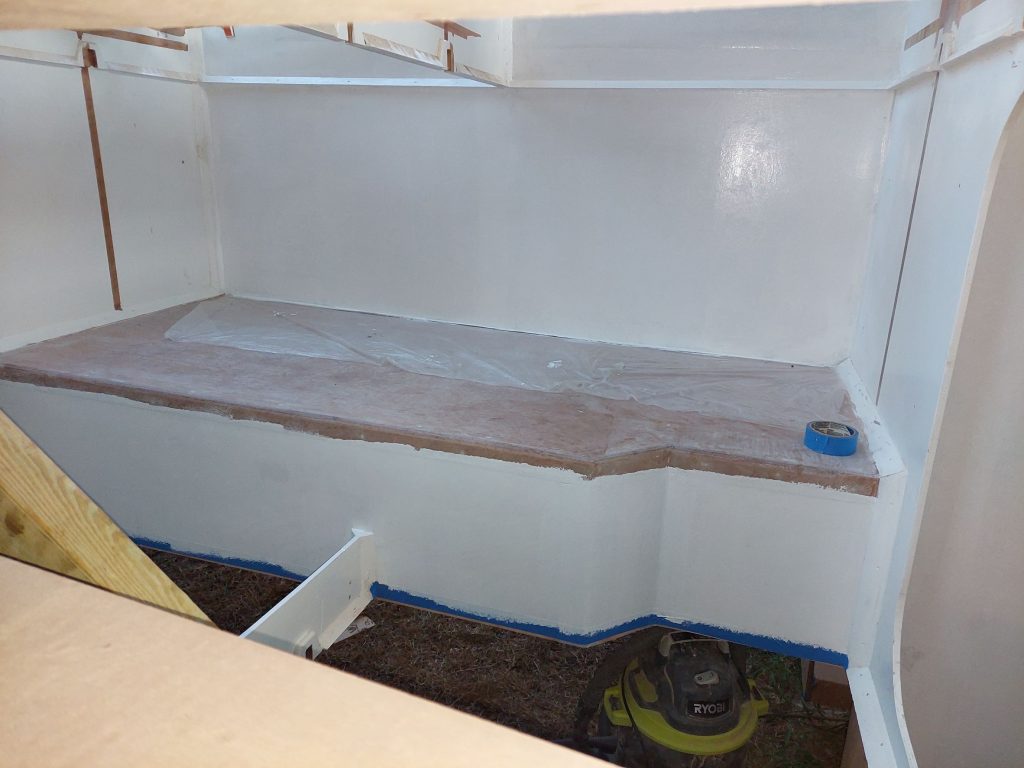
In contrast to the appearance of speed earlier in the week today was a slow one with careful preparation of the chainplate frames for glassing to the external plywood. I am being careful to remove any cured epoxy or at a minimum ensure that all the surface gloss is removed and well sanded surface is presented for gluing. In all there are five layers of glass to go over the join of the chainplate frames to the hull and today I managed only three layers on one side of one chainplate. On the bright side all the connections have been prepared so it is just a lot of glassing to go.
I am pushing forward with the glassing of the chainplate frames so that I can prime the settee locker area and work towards the stern priming the interior of all the plywood panels installed this week.
The title is appropriate for the sailing and for the boatbuilding but first the sailing.
Last Wednesday I had every intention to do a boat end start for clear air and a lane out of the strong incoming tide. Everyone else had the same idea and while we had a close hauled line to clear the stern of the committee boat there was an impenetrable wall of Division 1 yachts and other than breaking rule 14 and giving them all a nudge into the start boat the only choice was to let them all break the rules.
From our position down the line we were blanketed by the bargers and a long way from clear air. Well that is the end of the story. We never broke cover all the way to the top mark and were second last to round in conditions we usually enjoy.
The work home provided some relief and we had some very good angles coming into shortened short course finish line in Rose Bay. Others had equally good angles so we made little ground.
We are left to ponder how different it would have been if we had clear air and kept out of the tide as planned.
Back on the boatbuilding I have been bogging the water tank lids and the settee shelves to the stringers ahead of fixing the ply sheeting. Bogging in shelves takes time especially as each shelf meets the angled stringers at different angles. Nevertheless the job is finished and the next sheet of ply is ready for each side.




Other jobs have been progressing at pace including the rudder port reinforcement at the deck level and completing the plywood panel that separates the quarter berth from the locker. This panel had to be extended down to the hull skin and the join glassed both sides. For good measure the cleats that will support the bunk tops have been glued to the vertical panel so that the whole panel can be primed next time I am in the painting mood.
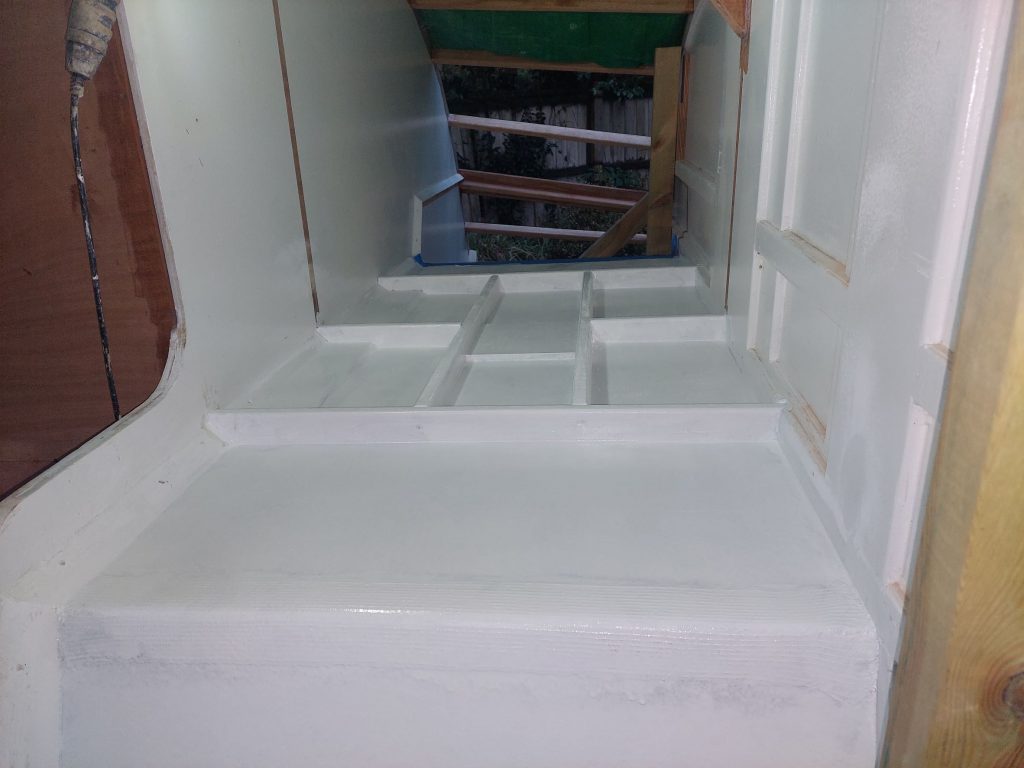

Since the last blog the bare plywood in the quarter berth ante room and the head has been primed, sanded and spot patched so the interior has a semi finished appearance and the plywood has a level of protection from the elements. I had hoped to do a second coat of primer but in the cool conditions it was insufficiently hard for machine sanding so I have let it cure and done extensive preparation for the second coat. I think that will be more successful as the finish is already very smooth.
There were extra cleats to be added to the plywood in the quarter berth and cockpit locker and a 12 mm doubler for the bottom of the locker to take the tie down points for the heavy equipment. So soon there will be a 75 mm strip of 24 mm plywood to take the straps that will secure the 16 kg spare anchor and the chain attached to the rode.

The potential damage from the heavy anchor always concerns me and on Passion X I have added Tasmanian Oak hardwood strips to the top of the stringers. The Tasmanian Oak is stock trim from the local hardware store and is an ideal timber for the task. I also use this timber to make the tracks for the sliding doors in the galley as it is tough and machines well.
Looking ahead I am inclined to complete the next sheet of plywood on each side before moving aft. Once fixed I can do the epoxy glass join inside and out and glass the chainplate frames to the skin. There is a total of four layers of 450 gram double bias to go over the connection and before the epoxy glass is too hard I would like to do the fairing and prime the shelf area behind the settee.
To be honest I will be torn between finishing the settee area and doing more external ply and the weather will play a big part. The settee area is well protected so it would be sensible to use any fine weather to complete the ply towards the stern where the transom sticks out from under the awning.
Prior to our Wednesday RANSA race we took Passion X for a speed trial under motor. This is my test to see if the hull is clean and she passed with flying colours. We achieved a tide assisted speed over 8.6 knots and the two way average was well over my 8 knot minimum requirement so she was good to go.
Pre start the westerly gusted up over 20 knots well in excess of the forecast 15 knots but as the start was downwind we elected to start with the No 1 heavy genoa. It was a good decision as the wind abated and we never saw 20 knots for the rest of the day. We did get the forecast dead square run to the top mark and by staying away from the crowd arrived with the leading yachts.
The work home was now dead into the wind with lots of crossings along the way. Occasionally we picked a shift and maintained our position near the front. Foreign Affairs managed a break followed by Allegro and Cuckoo’s Nest and then there was a large group including Meridian and Joli from GFS and the two Sydney 36’s Amanti and Crosshaven. Krakatoa was close behind as was Britannia. Agrovation was unusually playing catch up having tangled their genoa leads.
There was plenty of action up to Steele Point when Amanti went in too close and lost a lot of ground. We went wide and were rewarded with clear air and a good line into the mark in Rose Bay. The beat to Point Piper was also busy and we were passed by Meridian and Joli but on the run around Shark Island we were first with genoa out to windward and went straight to the mark with good effect. The work down the back of Shark Island was the icing on the cake as Meridian and Joli were headed going into the mark. Behind us Crosshaven and Amanti were lifting all the way into the mark while the shift did not reach us.
Very fortunately Amanti and Crosshaven kept going on starboard well past the mark which allowed us to tack onto port and make distance to the finish. Joli and Meridian were caught with the starboard tackers carrying on too far and that cost them a lot of time.
Approaching the finish it was our turn for an unfavorable shift as we were headed on the beat to the finish so that we could not cross the line on port. Meanwhile Crosshaven behind was lifted all the way to cross the line before we could tack onto starboard. The line was terribly biased in favour of the port tack but we managed to hold on for a 2 second lead over Meridian and a 4 second lead over Amanti.
We were happy with our mid fleet finish on handicap and the close racing was a bit of a thrill.
Meanwhile back at the boat yard the several days of fine weather were put to good use. It was so unusual to be able to leave the tarpaulins off overnight.
The first task was to finish the and trial fit the quarter berth door so that the two door panels could be glued into position. First the adjoining panels had to be stiffened with straight planks so that the door panels would be both straight and in the correct alignment. Next the joins had to be masked to keep the ply clean and finally the glue applied. It took much longer than expected and was finished under lights at 6:30 pm.

At 1:00 am I was awake so removed the masking tape before the glue was too hard and early next morning was cleaning the surplus epoxy before it cured further. The result was pleasing so I took a few photos for the record.

In preparation for fitting the shelves in the settee area the chainplate frames had to be trimmed to their final dimensions after which the laser level was used to establish the position of the cleats for the shelves. Each of the four cleats per side was fastened with 20 mm silicon bronze nails while the epoxy set and it was encouraging to be able to hammer the nails in with little bounce back. That shows how rigid the chainplate frames have become now that they are fastened to the water tank tops.

Being anxious to protect the plywood from the inclement weather I purchased a HVLP spray unit to apply the epoxy primer. The section of the hull from the bow to the chainplates was then sprayed in a short afternoon. The spraying is a work in progress as I found it difficult to adequately cover the stringers without getting runs on the ply. For the first coat I compromised with a brush for loading up the stringers and with brushing out the runs. I think it will be fine for loading up primer on external hull and in the meantime I have plenty of interior on which to practice.

Between jobs I took delivery of another 70 litres of epoxy resin and an additional 16 sheets of plywood. If you said I was hoarding against future shortages I would not deny the accusation.
One of my jobs is to take photos for the record and I find that I have to make time for this activity as I tend to attack my list of jobs with a certain level of intensity. One catch up photo was the mast step support in front of the bulkhead and another was the interior view of the head doorway.
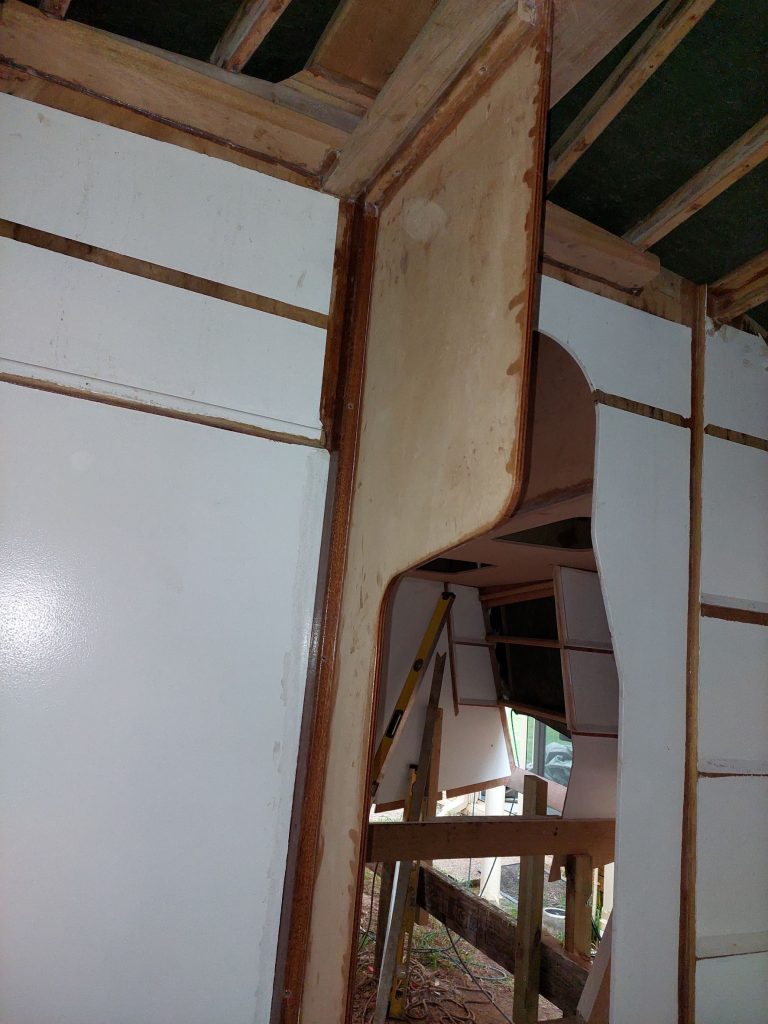
Yesterday I was keen to sand the primer between the bow and the mast step and get on another coat but it was not to be. The primer is very hard and needs aggressive sanding to smooth the surface and remove the gloss. Also the first coat shows up any glue drips and any rough timber so the sanding took much longer than expected.
While up in the bow sanding I took the opportunity to finish the bob stay connection. The bob stay will be a dynex dux which is stronger than dyneema and the rope will be passed through a 12 mm hole just above the water line. The hole go through 8 layers of 12 mm ply and two layers of 15 mm hardwood which are wedges in the bow to bridge the gap between the tangent stringer doubles and the 48 mm wide bow knee. That is another job done and mighty strong too.

With not enough time to paint I rounded the corners of the cockpit underside in the quarter berth ready for a layer of double bias glass to reinforce the join and stiffen the floor. This is over and above the ISO requirements but I did the same on Passion X with excellent stiffness resulting.
Today is Friday and the rain has returned with a vengeance as if to make up for the sunny days. The ground around the hull is more boggy than ever but I was able to glass the underside of the cockpit floor and prepare all the element for the rudder stock ports.
Looking forward to the coming days, rain is forecast for a week. That means no ventilation for spraying epoxy primer but I might revert to the roller and brush method in areas where there is adequate ventilation. In this way i might get most of the bare timber covered before I move on to installing extra plywood.
I cannot recall a sailing day with more random wind directions than yesterday. We made a good start at the boat end but on the first header the pin end yachts crossed and in a few minutes Amante was so far ahead she was in a race of her own. For a few tacks we crossed tacks with Fidelis but when she sailed over to Steel Point she came back on a big lift on starboard. To cut a long story short we short tacked the middle of the course and while generally on the lifting tack both sides won out big. The run home brought no relief as the breeze died and shifted so that by the time we were supposed to be running home we were beating into a dying breeze. As painful as it was we kept trying but the conditions provided no relief.
As well as the fluky conditions I suspect that either the propeller did not feather or we picked up some garbage on the prop but whatever the reason we managed a last place on handicap only beating the did not start yachts.
Thankfully the boat building is going better than the sailing. Since the last post I have finished the cockpit all the way to the transom and that means the quarter berth is finished too. The forward side of the mast step is installed and the doors to the head and quarter berth are well advanced.
The doors have taken longer than anticipated but at the same time I have been rather particular with the details and as a result the complete door assemblies are almost done. All that remains is some trim on the 9mm doors to stiffen them and the hinges and catches. Given the miserable weather we are having I may well finish these in the garage as a rainy day job.
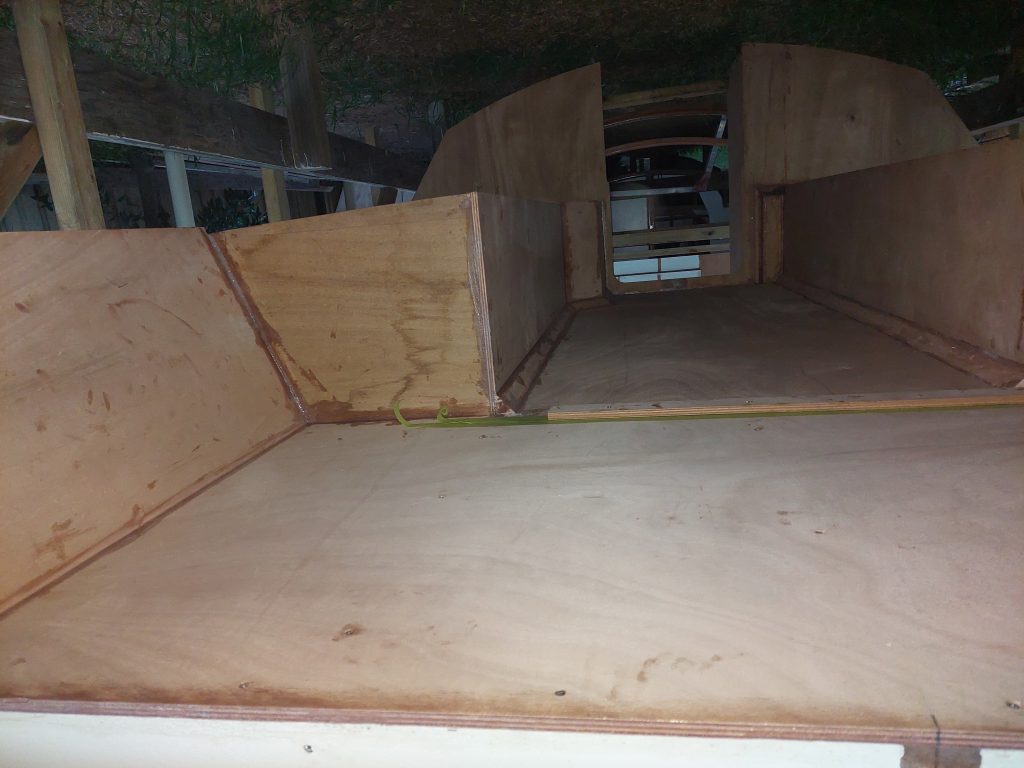
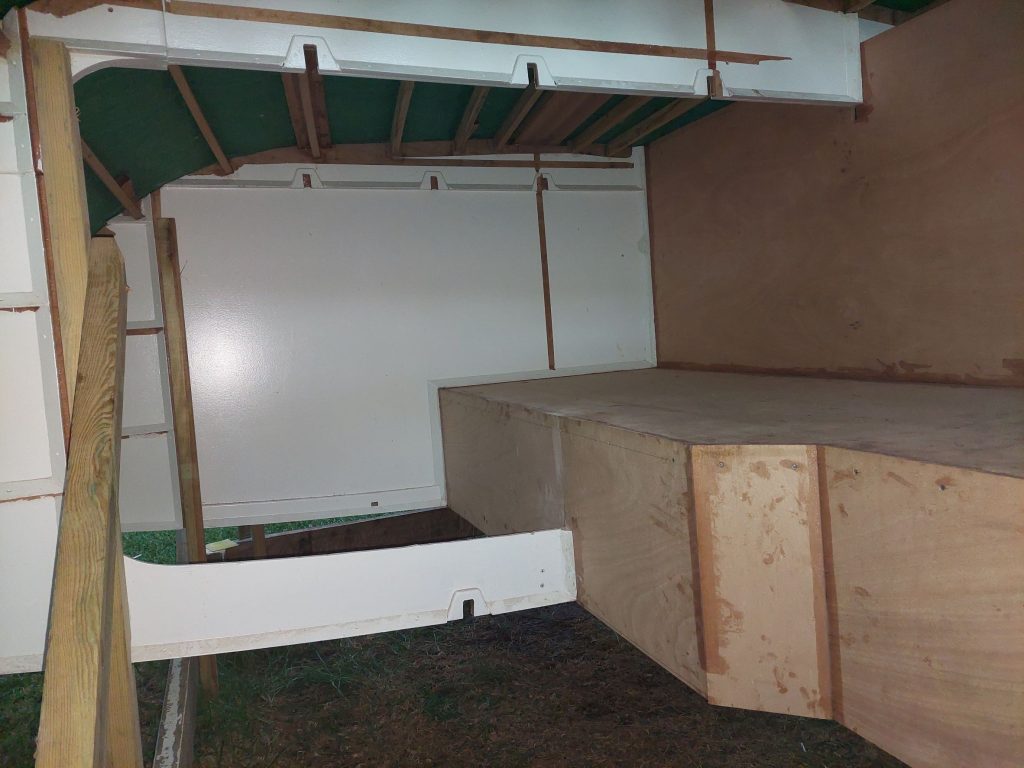
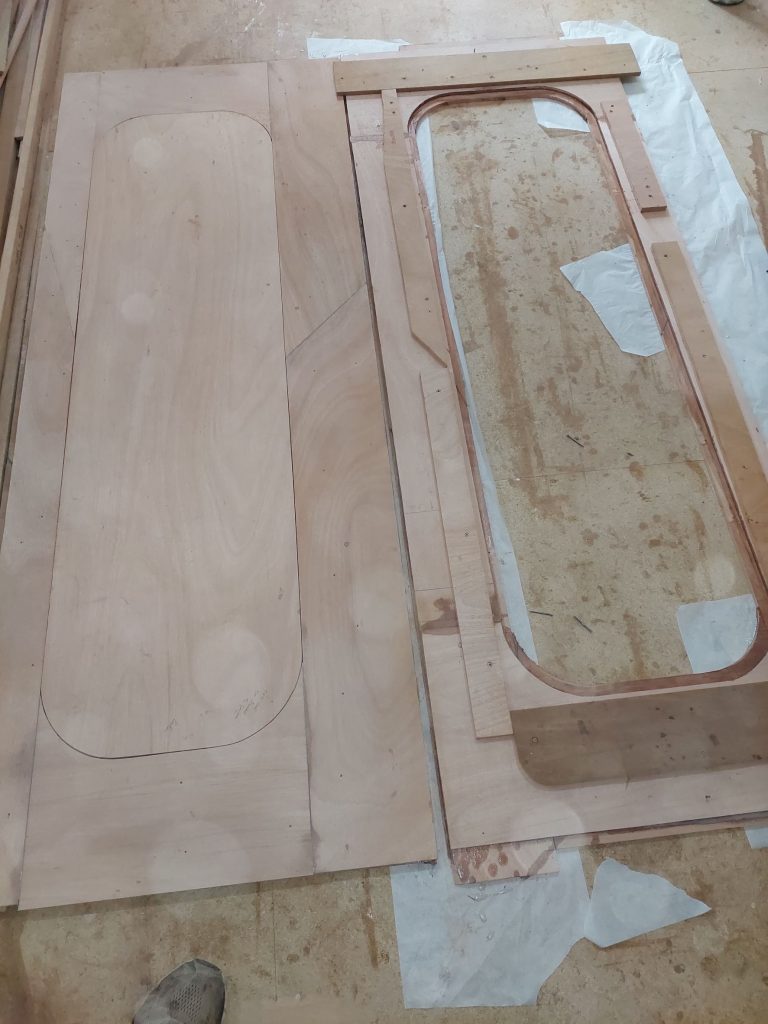
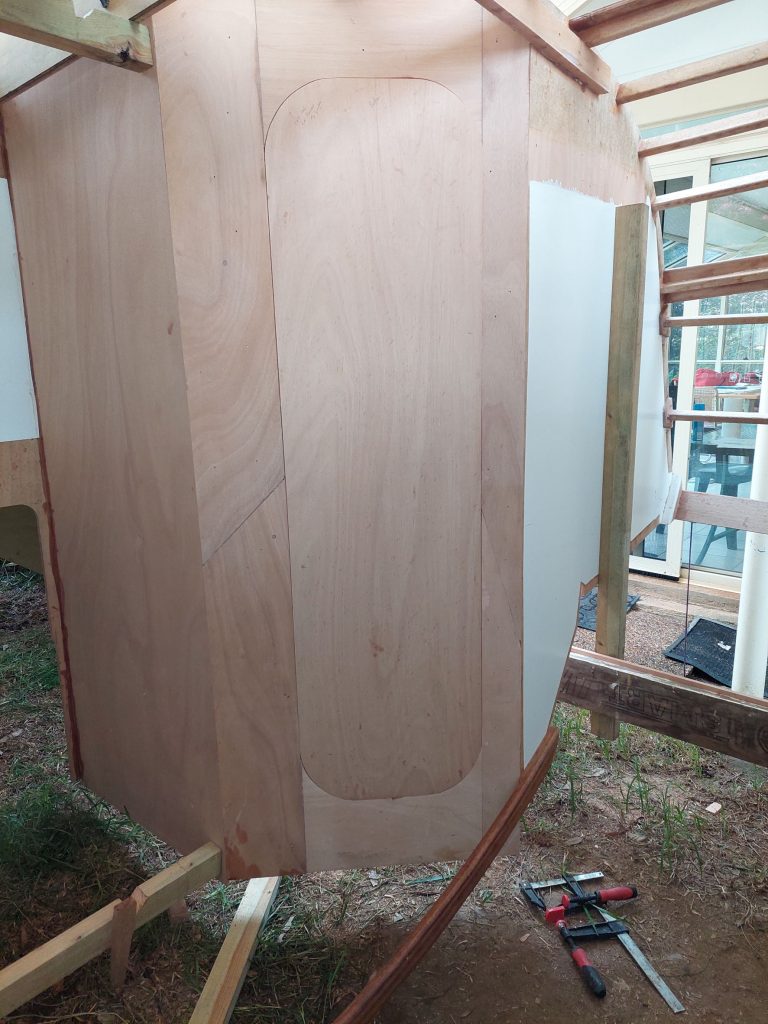
In between larger jobs I have been filleting and sanding in the bow from the stem back to the mast step and with another half day of sanding should be ready to spray a lot of epoxy primer around. The primer will protect the completed parts of the hull from the wet and damp weather should it persist.
What a glorious day for the first race of the RANSA Winter Wednesday series! The race had it all with sunshine and better winds than forecast with enough shifts to keep everyone on their toes.
The first leg was into the eye of the wind and while windward leeward courses are not our strong suite we did get a good start at the pin and took the opportunity of the first flick in the breeze to get back across the course. Allegro with new antifouling was out of the blocks strongly and held her lead over us all day. Agrovation, clearly in a class of her own was soon in the lead through good boat speed but also picking the first shift to the east to perfection.
We were happy to be crossing tacks with Amante, Foreign Affairs and Crosshaven and to keep in touch on the long slow run home. Only the nimble Brittania popped our bubble when she sailed around us going into Rose Bay and did the same to much of the fleet to the finish to win on handicap.
I am content with our mid fleet position and happy that everything worked as it should.
The sailing did take second place to the boatbuilding this morning as I was determined to complete the front section of the new cockpit design on the new yacht. I rose early to finish what I could not do yesterday due to the complexity of the shape around the front of the cockpit. The cockpit narrows from 850 mm to 600 at the bulkhead so that we have more headroom in our enormous quarter berth. Now that we can see the berth in real life any complexity is well worth the effort. Now that we can see how much extra cockpit room is created by taking it right to the bulkhead we are very happy.
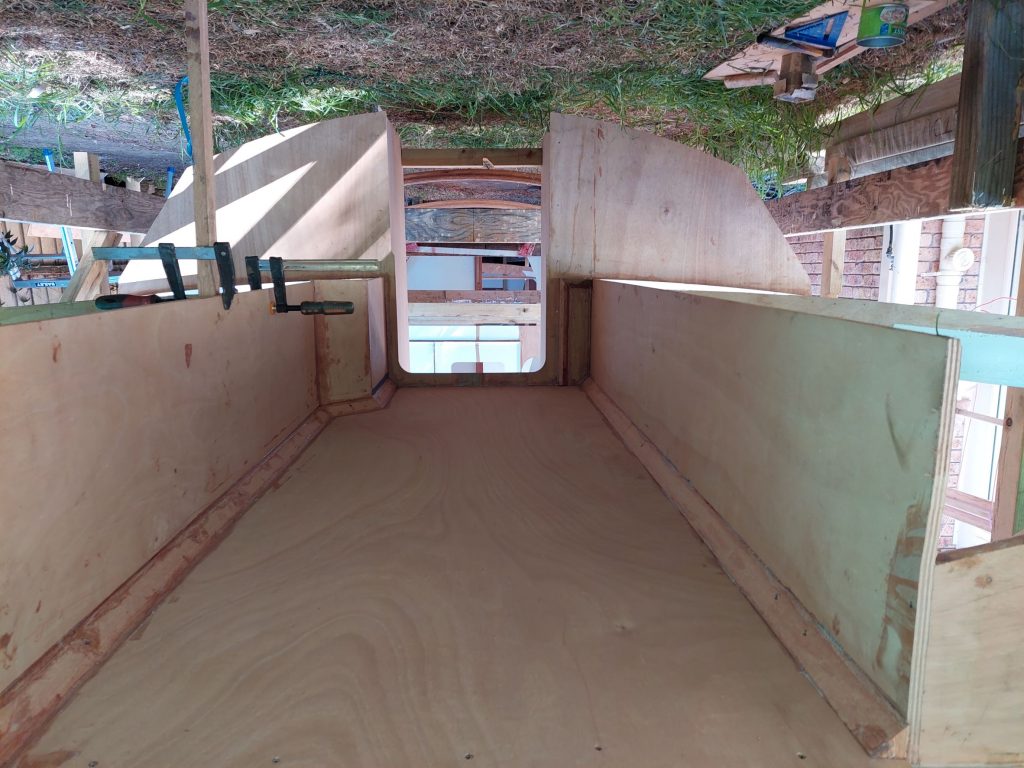
There are not a lot of photos because I have been working to dark and the sun sets not long after 1700 hours in our valley.
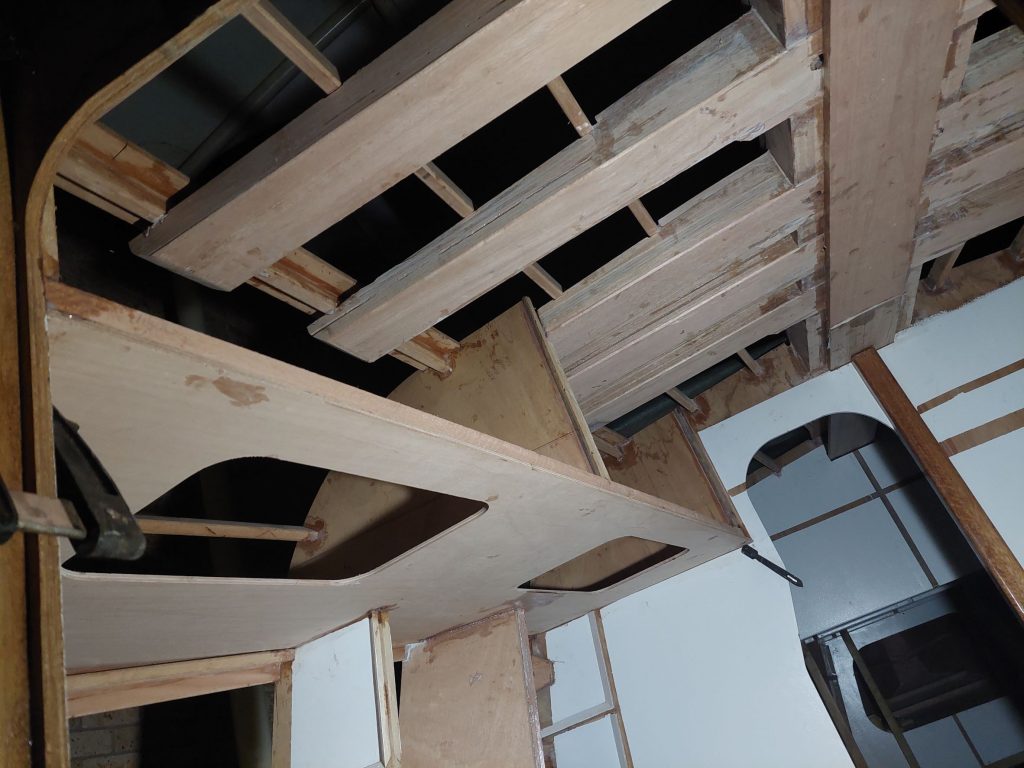
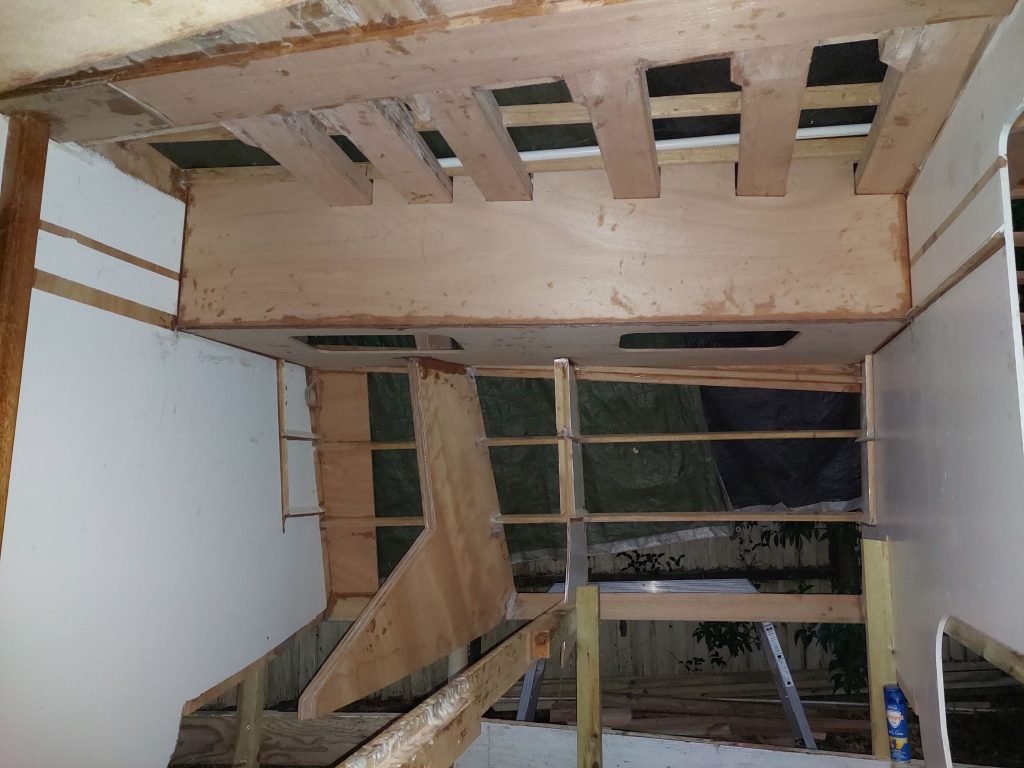
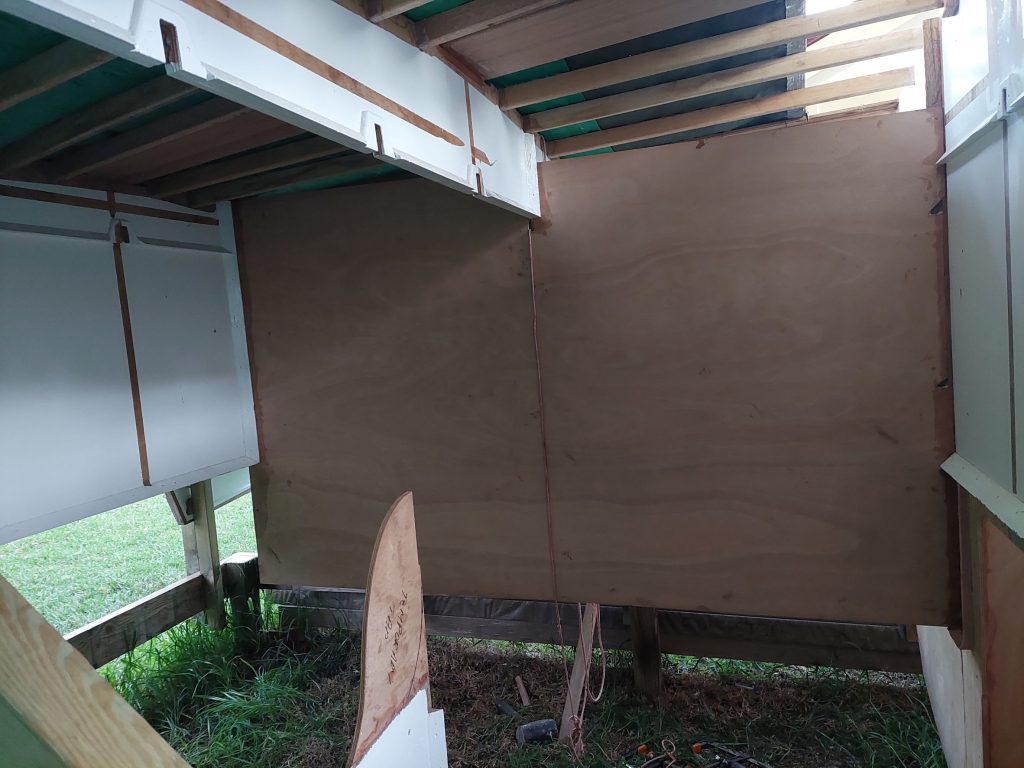
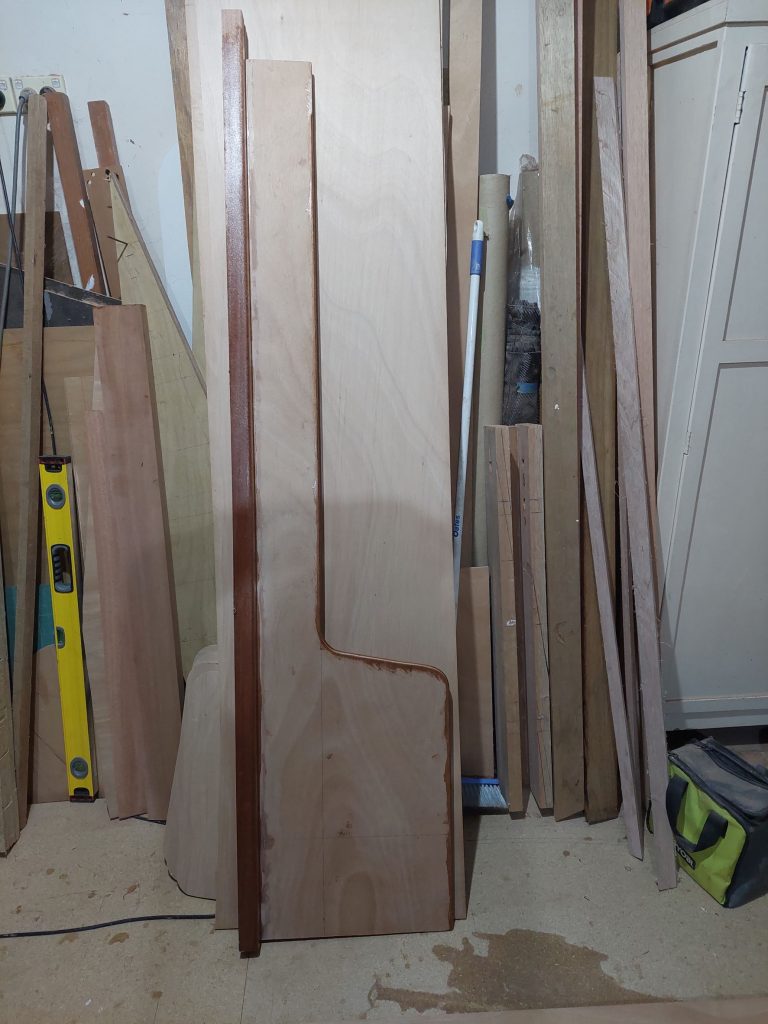
After a brief period of enjoyable alfresco boatbuilding the rain has returned, the lawn is saturated and the tarpaulins are back on the boat. To be fair there has been several days on pleasant weather when the activities on the project have been humming along but the majority of the time progress has been weather affected.
There was a brief few days when the sun shone enough for the lawns to be mown and for one sail to be hosed down on the grassy slope and then taken into the sun room for final drying but since then it has been damp.
Yesterday was Wednesday 27th and with persistent rain I confined my activities to cutting timber for the mast step and for the water tanks.
I have found the vacuum cleaner attached to the saw bench does a reasonable job of sucking up the sawdust and so long as the lengths are short I can operate inside the garage and so the mast step timber is cut as are some 30 by 30 triangular cleats for the water tanks and the V berth bunks.
Inside the garage the jig saw has been busy cutting out the 9 mm ply for the water tanks and various other locations. Fitting the water tank tops has been a little more difficult than on Passion X as on the new build the sheet plywood meets the tangent stringer at the hull so there is a lot of careful cutting to get a fit that is good enough for the gap to be filled with thickened epoxy. It took a full day to fit the water tank fronts around the massive keel floors and a day to fit the water tank tops around the tangent stringers but both are now ready to go when the weather invites me outside again.
Before the water tank plywood I was fully occupied with completing the infill blocks on the keel floors and installing the king plank. I am particularly pleased with the king plank fit and the 12 to 1 scarf join situated over a long solid infill section just behind the mast step. It was a bit fiddly getting the surfaces coated both sides with thickened epoxy but by sliding the king plank forward the rear could be moved from side to side to expose the surfaces that needed glue and then by sliding it back the front end could be swung from side to side to repeat the glue application. I tried to err on the side of too much glue so there was lengthy clean up exercise once the planks were clamped in place.


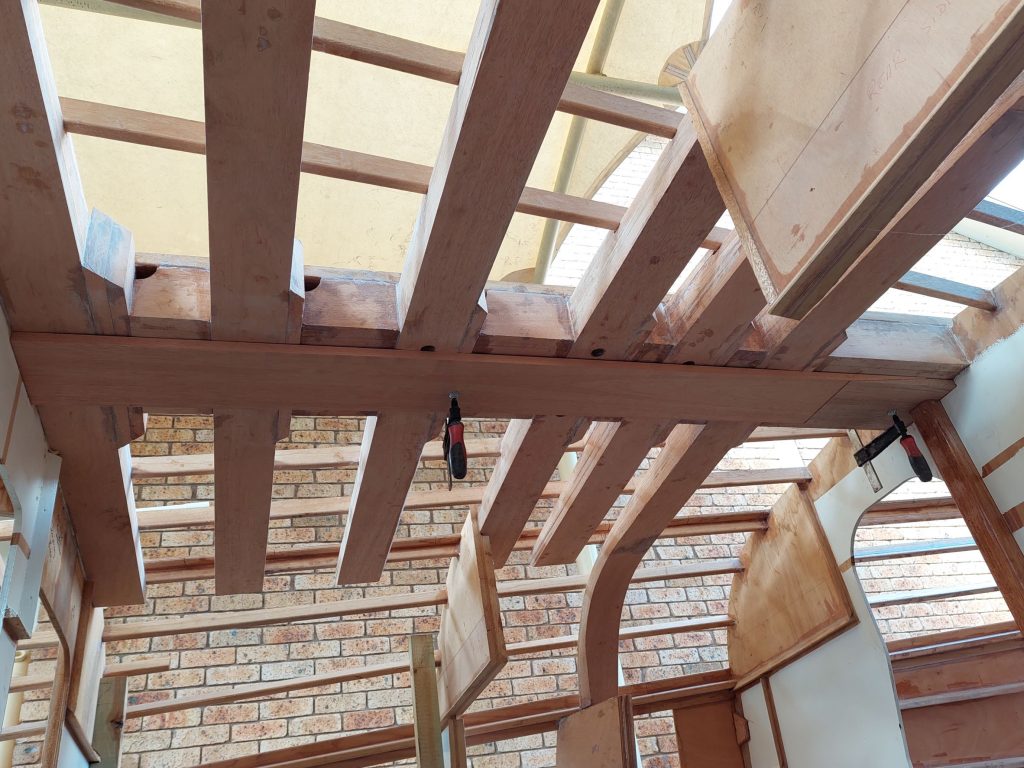
My last job yesterday was fitting 30 by 30 cleats to the frames for the join between the top and sides of the water tank so when the weather and mood are aligned there will be photos to show.
Today it rained consistently so instead of starting with boat building I headed out early to ready Passion X for the upcoming Winter Wednesday series. Sails were retrieved from the sailmaker and reloaded on board together with fuel and a little water to keep the bottom of the tanks wet.

Between showers and they were the predominant feature of the day, I acid washed the hull to remove the grime from the last trip to Port Stephens. The floods had brought down so much iron that the hull was a light beige colour and in need of some cleaning. The acid wash worked a treat to my surprise as I applied coats between showers and retreated to the comfort of the cabin whenever the rain returned.
The intermittent cleaning and resting was a relaxing way to spend the day and with a break in the weather I was able to disembark along with some surplus equipment that is not needed for the winter racing.
After a very pleasant Sail Port Stephens and return voyage I am back to boatbuilding in a measured way. Over Easter we had family visiting from Ballina, family gatherings and a great family sail on the harbour. A bonus with the family sail was the opportunity to hoist damp sails from the last regatta and give them a good airing in the warm sunny conditions. We also finished unloading Passion X by removing the spray dodger and the surplus kitchen ware and cooking ingredient. She is almost back in racing condition with just some minor routine sail maintenance to be finished.
The boatbuilding has to be fitted in around these activities and by design I chose some tasks that could be done in short time slots.
I take the view that everything has to be done some time and spreading the tasks out gives variety to the day.
When we left for Port Stephens the keel floors were installed but that is just the start. Each floor has a doubler across the centre to compensate for the timber removed for the keel bolt holes.


Between the doubler and the next floor there is a full 300 mm width block by 115 mm deep of end grain timber to take compression loads in the event of a grounding. This is made up of nine blocks 33 mm wide with a extra narrow block where needed to achieve the full width. After much debate with myself I chose to glue the blocks before installation as that allows me to make a neat limber hole passage and epoxy saturate the end grain before installation.

Some of the fill in jobs include adding 10 mm strips to the stringers between bulkhead C and D to compensate for the extra frame spacing compared to Passion X. The extra 100 mm length plus the extra 400 mm width in this area makes the V berth cabin seem enormous and I am excited for the extra space under the bunks for sail storage. I am not being over dramatic when I say I am excited because I find myself shuffling sails around in the V berth.
When we go offshore we have a No 1 light, No 1 heavy, No 3 carbon, No 4 Hydranet, a storm jib, two symmetrical spinnakers, a asymmetric spinnaker and a code Zero. For harbour racing we take off the No 4 and put on an old high clewed No 1 for the social races so there is always a lot of sails to move around with half under the lockers and half above the berth top. With the wider berth tops on the new build each half will lift more easily and more sails will fit underneath.
There is also a large increase in volume in the locker under the chain locker. It is 300 mm longer and 400 mm wider at the fat end and that should be excellent storage for light but bulky items and certainly big enough for an a spinnaker or two.
I find myself torn between completing the front of the yacht and progressing the keel and aft end and so am doing a bit of both. Once the king plank is installed everything from the stem to the mast step could be finished. When I say finished I do mean finished. All the locker shelves are cut and could be installed and all the interior could be painted. It is very tempting to do this as it would spread out the sanding and painting tasks. In this respect I am reminded that 90% of boatbuilding is sanding and I have already destroyed one random orbital sander and one multipurpose tool.

The strong southerly forecast caught me unprepared for the trip to Newcastle so I had to abandon boatbuilding and prepare Passion X for a Wednesday morning departure ahead of the Thursday front. The main tasks were loading all the category 4 safety items, doing an oil and fuel filter change and loading the boat with our bedding, clothes and provisions. In a classic just in time I returned home for dinner and a trip back to the yacht for a overnight sleep so we could depart at 6 am on the Wednesday morning. This was the last daylight saving Wednesday of the year so we had enough time for a safe trip to Newcastle.
We arrived Newcastle at 4 pm just as the wind was building and surfed a wave into the harbour at over 12 knots. Kevin had been kind and accompanied us on the trip up in case the wind arrived sooner than forecast and as Elaine was seasick for the last four hours his assistance was most welcome. He made a quick departure to catch the train back to Gosford and Elaine and I settled in for few days of rest while waiting for the Newcastle to Port Stephens race on the Sunday.
After the last minute rush to prepare Passion X the few days in Newcastle were most welcome.
Sunday came soon enough and we took part in the most genteel race I can remember. A two sail reach from the start line to the finish line! Some yachts set spinnakers and ended up so low that eventually they dropped the kites and came quite hard on the wind to finish.
We had an interesting tussle with Lady A who carried a code Zero skillfully and we only passed them at the finish when they had to furl the sail. Lady A took out the handicap and we were pleased with a 6th place out of a large fleet.
Sail Port Stephens was the usual great regatta with the best conditions kept for the sailing days and the miserable wet weather falling on the lay day. The final day was abandoned when there was no wind.

Elaine grabbed the opportunity to head back to Newcastle that afternoon so we scrambled to reload Passion X and headed out at 3 pm. Sunset was around 5:30 pm and maratime twilight just on 6 pm so we had an hour of motoring in the dark to reach Newcastle.
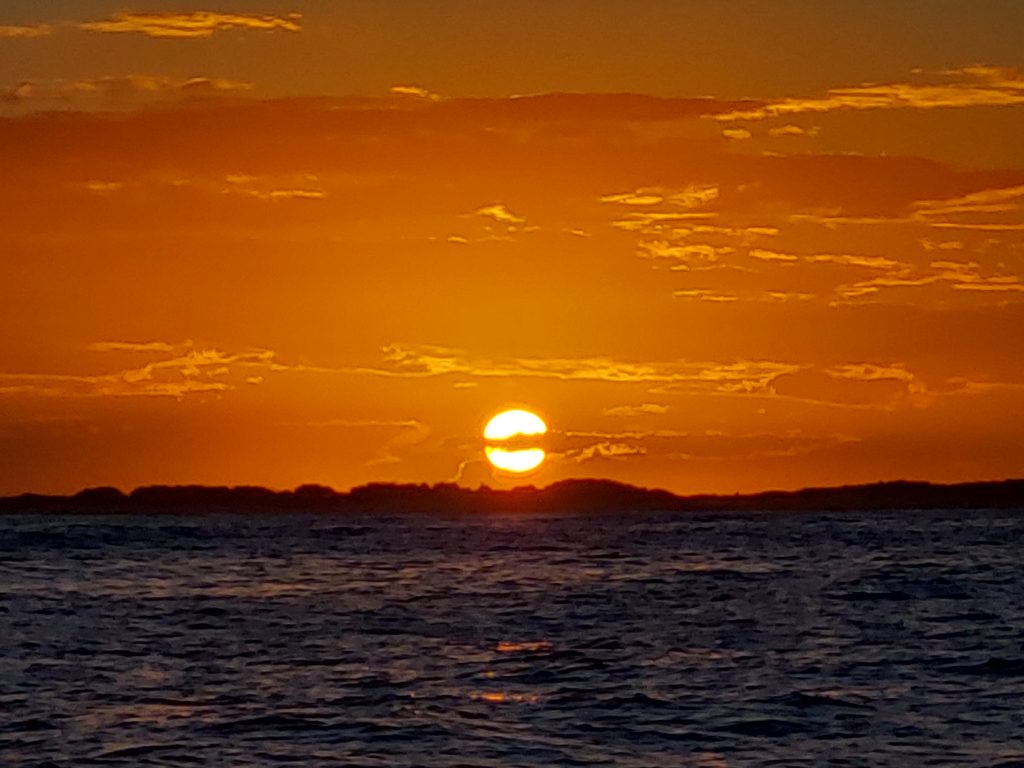
Monday was the last light wind day to get south before the next southerly front arrived so we set out at 7 am and arrived safely in Sydney Harbour at 4pm just as the wind was picking up to 20 knots.
We consider ourselves very fortunate to have had such good weather windows for out trips.
By 7 pm were were back at West Pennant Hills having unloaded Passion X.
Next day I installed the engine beds in the new build and today I began to prepare the bulkheads for the king plank. The king plank runs from bulkhead C to the engine beds and the engine beds run all the way to companionway at bulkhead H so in a very short time all the significant structure will be installed.
Now that daylight saving time has gone for another 6 months I have installed lights inside the hull and there I worked away today out of the wind and rain.
This season will go down as one of the most disrupted with adverse weather conditions. Three of the seven Autumn series races have been abandoned and there has been some did not finishers in the races that were sailed.
I cannot write much about abandoned races but it seems we have become a little too cautious in using as our benchmark a weather station a long way from the club sailing waters and one which is typically several knot windier than our venue.
I do appreciate that for the smaller craft a very cautious limit is wise but for the larger ocean going yachts which are capable of handling much windier conditions they are being deprived of valuable sailing experience.
As the season winds up another southerly front is approaching and our plans for a pleasant passage to Newcastle for the Newcastle to Port Season offshore race are up in the air. That is an apt phrase given the shows around 30 knots offshore at the relevant period. It is all going to blow through for the Sail Port Stephens Regatta and it is a pity we cannot save some of the windy weather till then.
